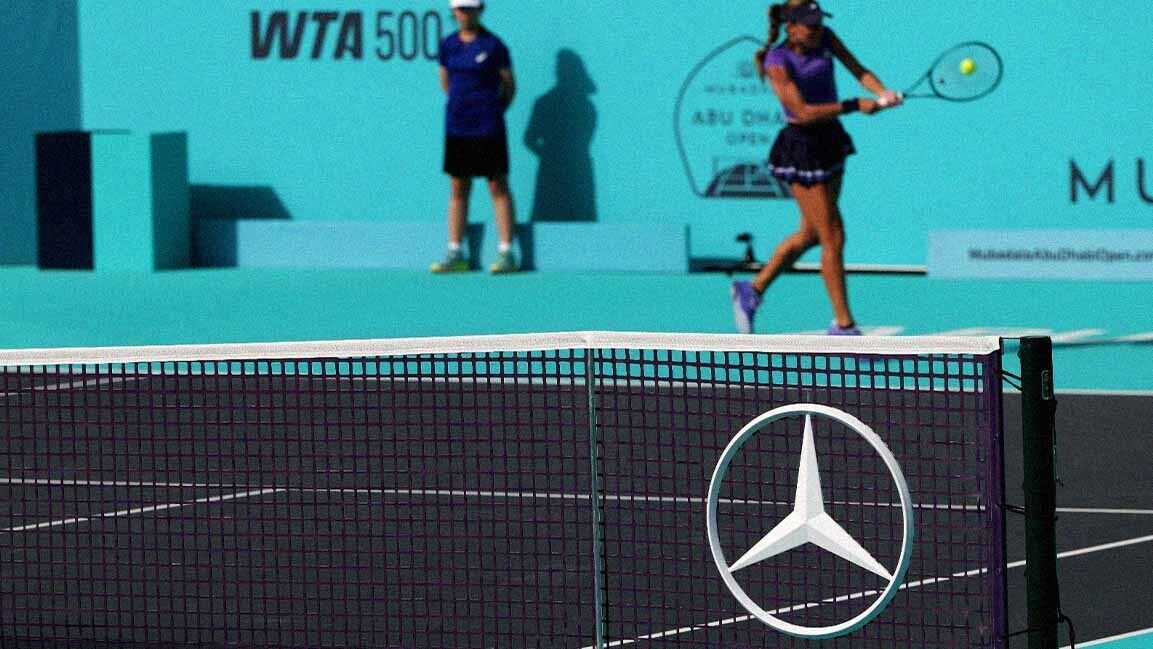- | 9:00 am
Is the Middle East becoming the epicenter of the experience economy?
Experts share the reasons why the region stands to gain from the experience economy.

The Middle East, particularly Saudi Arabia, the UAE, and Qatar, is investing in hosting high-profile events to boost international appeal while providing citizens with a growing array of entertainment and cultural experiences. Be it the FIFA World Cup, World Expo, Formula 1, or the recent Coldplay concert in Abu Dhabi. The concert, which brought thousands of international travelers to the UAE’s capital, wasn’t just a concert; it was about experiencing the flavor of Abu Dhabi through it.
There is a growing shift toward the experience economy, which is transforming industries ranging from tourism and entertainment to retail and hospitality. It presents a massive opportunity for businesses to connect with consumers in fresh, meaningful ways that go beyond traditional products.
Joseph Pine, co-author of The Experience Economy, says, “We’ve gone from an agrarian economy based on commodities to an industrial economy based on goods for a service economy, and people prefer experiences over things. People want to spend their time on experiences they value.”
The Middle East’s role as a hub for global events is also growing due to improvements in event-hosting capabilities. “Hosting mega-events like the FIFA World Cup 2022 in Qatar and Formula 1 races has driven major investments in venues, transport, and hospitality,” says Cosmin Ivan, CEO of Platinumlist, a leading online ticketing platform in the MENA region. These investments have bolstered the region’s ability to host world-class events that attract local and international visitors.
“These flagship events have strategically showcased the region’s potential on the global stage. Through targeted marketing—leveraging data-driven audience segmentation, immersive digital storytelling, and high-impact partnerships—the Middle East has amplified its appeal, driving international engagement and long-term tourism growth,” says Imran Khan, Founder & CEO of PIXL Group, a marketing agency in Dubai.
CAPPING IN ON ENTERTAINMENT TOURISM
While hosting and bidding for international experiences is a way to mark yourself on the world stage, the region has much to offer a global audience in search of authenticity.
“People increasingly question what is real and what is not in seeking out experiences, and increasingly want the real from the genuine, not the fake from the phony. So you need to lean into that, that realness, that genuineness, that authenticity, and get people to experience it that way,” says Pine.
There are several reasons why the region stands to gain from the experience economy. Starting with the rapid growth of concert tourism and entertainment travel. Ivan says, “Large-scale concerts, like Ed Sheeran’s show in Dubai with over 60,000 tickets sold, attract international visitors—up to 45% of attendees from abroad.”
The influx of global visitors fuels demand for hotels, restaurants, and local transportation, making experiences in the region even more valuable. Ivan adds that expanding global nightlife brands, such as Pacha Ibiza Dubai and Ushuaïa, have further strengthened the region’s appeal.
“With investments in event infrastructure and developing world-class venues, the Middle East is positioning itself as a prime destination for experience-seeking travelers,” he says.
Khan emphasizes the Middle East’s strong infrastructure, cultural initiatives, and favorable policies that attract international events and tourists. He highlights the region’s blend of traditional hospitality with modern event experiences, positioning it as a global leader in event tourism.
However, viewing the rewards of investing in the experience economy purely from a monetary perspective is a narrow approach. The value extends beyond economics. Pine refers to a well-known economic study that suggests that building a sports stadium in the US typically doesn’t provide a direct financial return. There’s the “psychic value” of belonging, the social connections people form, and the sense of pride that comes with such investments. Events have the potential to bring cultures and people together, fostering deeper connections.
As Pine points out, the success of such investments depends on execution: how well the event is staged, how guests are treated, the conversations sparked, and the lasting memories created. “While it might not always result in immediate financial returns, the experience economy holds greater potential for meaningful long-term impact than traditional advertising methods like billboards or social media campaigns. The direct experience of who you are and what you offer creates more lasting value,” he adds.
The experience economy is set to grow, with the Middle East slated to host more events and increase its experience offerings.
“The planned unified GCC visa and the GCC Railway (expected by 2030) will make cross-border travel easier, allowing visitors to attend multiple events across the region seamlessly,” Ivan says. He adds that very shortly, one trip could include a concert in Dubai, a business forum in Abu Dhabi, and a Formula 1 race in Qatar, making the region a true epicenter for global experiences.
DOES IT HAVE AN EXPIRY DATE?
Pine argues that the Middle East offers a unique advantage in attracting global tourism. He says, “Unlike Las Vegas, which predominantly draws 80% of its visitors from within the US, the Middle East can pull visitors from the entire world.”
He notes that the region is much closer to larger populations, offering a more accessible and diverse draw. While cities like London, Amsterdam, and Venice are fantastic tourist destinations, they often have the challenge of being long-established capitals with limited capacity to scale tourism significantly. Many of these cities are even focused on slowing down tourism, such as Venice, which has unique challenges.
In contrast, the Middle East starts with a blank slate, creating something new. “Dubai, for example, began with nothing and has since built a world-class destination,” Pine says. He believes this blank canvas allows for more creativity and growth, with cities like Doha and Riyadh expanding rapidly to offer new experiences.
“This approach mirrors what Las Vegas did,” he adds, “it started as a desert and transformed into an oasis that continues to evolve.” Pine sees the Middle East following a similar path, building from the ground up to create a dynamic destination for global visitors.
It has the potential to build a thriving experience economy but with careful planning and foresight. According to Pine, the key to success in the experience economy is understanding how to control overcrowding.
“The answer is simple—you need to charge an admission fee,” he says. “If you charge for undifferentiated products, you’re in the commodities business. If you charge for tangible things, you’re in the goods business. You’re in the services business if you charge for people’s activities. But you’re in the experience business only if you charge for the customer’s time.”
Pine highlights how experiences, like sporting events or concerts, always involve an admission fee because they are, by nature, experiences. He points to places like Venice, where an admission fee is charged during peak tourist seasons to control overcrowding.
“They’re already charging admission, in a way, through hotel taxes and tourist fees,” he says. “But they should call it what it is—an admission fee. This signals that the place is worth experiencing.”
Pine also suggests a dynamic pricing model, where admission fees could increase due to over-tourism. “If tourism becomes too much, simply raise the fee,” he says. “This will reduce the number of visitors and use the funds collected to improve the infrastructure needed to manage the crowds, including addressing challenges like waste management.” He views this approach as a win-win scenario for everyone, aside from those who can’t afford the fee.
WHERE THE WORLD COMES TO EXPERIENCE
According to Ivan, the Middle East offers global event organizers unique advantages in terms of logistics, infrastructure, and audience engagement. He highlights that state-of-the-art venues such as Expo City Dubai and Lusail Stadium, paired with over 152,000 hotel rooms in Dubai, provide exceptional support for large-scale international events.
“These world-class facilities, alongside efficient logistics supported by projects like the GCC Railway and the Bahrain-Qatar Causeway, enable the seamless operation of major events,” Ivan says. Additionally, major airport hubs in Dubai and Doha, which handle millions of visitors annually, strengthen the region’s logistical capacity.
Ivan further notes that the Middle East’s strategic location, which connects Europe, Asia, and Africa, provides easy access to key global markets.
“Most key markets are just a 6-8 hour flight away, making the region a convenient and attractive destination for international visitors,” he says. The introduction of the upcoming unified GCC visa, Ivan adds, will make multi-country travel for attendees even easier, enhancing the region’s appeal to global event organizers.
Beyond infrastructure and logistics, Ivan emphasizes the region’s ability to attract high-spending, engaged audiences. “Global events like Formula 1, the FIFA World Cup, and GITEX Global continue to draw millions of attendees, demonstrating the Middle East’s status as a premier destination for entertainment and business events,” he says. This combination of advanced infrastructure, efficient logistics, and a dynamic audience base sets the Middle East apart as a prime location for major global events.
How long before the Middle East becomes the experience capital of the world? “I’d give it about five years for them to get there, but it’s most likely happening,” Pine says.







































